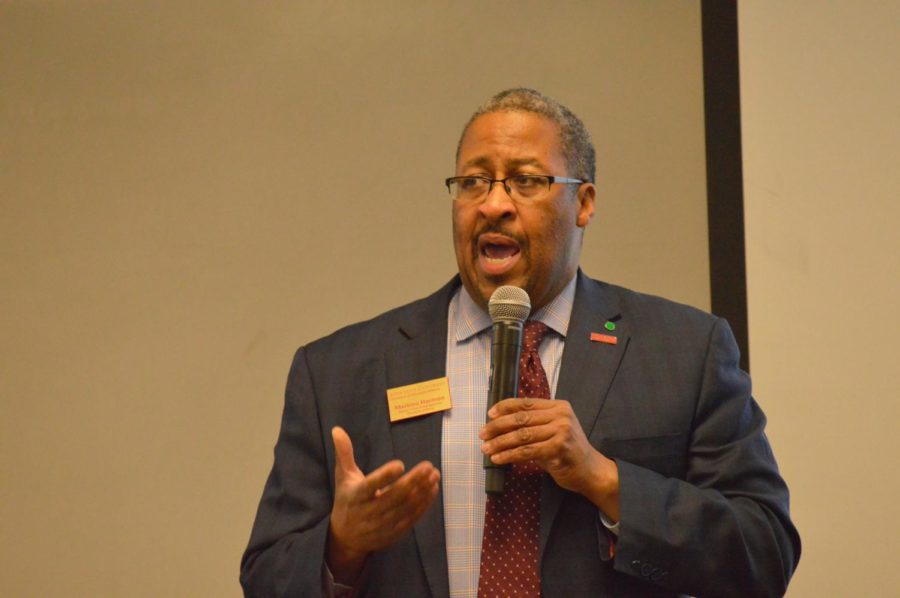Campus climate efforts continue as students speak up
November 11, 2019
Implementations of reforms following the campus climate survey performed two years ago continue to move forward as student efforts to speak out on campus ramp up.
Recently, some students took part in a protest on campus to bring attention to controversial events occurring around campus and demand change.
On Friday, President Wendy Wintersteen sent an email to all Iowa State students, faculty and staff discussing the efforts and laying out changes.
“[Thursday] night, in the Sun Room of the Memorial Union, my leadership team and I met with members of Students Against Racism,” Wintersteen said in the email. “The meeting was an opportunity to share a series of actions the university will take in response to student demands following recent acts of racism.”
Furthermore, Wintersteen brought up what changes would be coming to campus.
“At [Thursday] night’s meeting, my team and I outlined 10 actions, including expanded and targeted training for administrators, faculty, staff and students,” Wintersteen said in the email. “For starters, campus leaders — myself, senior vice presidents, deans and other senior leaders — will take cultural competency and cultural humility training before the start of the spring 2020 semester. The complete list of actions was distributed at the meeting and is available here.”
The survey, performed in fall 2017, was analyzed by grouping the data into four sections: undergrads, grad students and postdocs; faculty and merit staff; and professional and scientific staff.
Senior Vice President for Student Affairs Martino Harmon was part of the team that reviewed the results of the survey.
One common refrain across the groups surveyed was a request for further inclusivity and diversity around campus.
“[The undergrad section proposed to] assemble a group of individuals that can assess opportunities and spaces on campus where we can enhance and increase inclusive images via art, redesign of spaces and ensuring that spaces are more inclusive,” Harmon said.
Another multi-level issue spotted in the survey is a desire for better child care for parents on campus.
This is being addressed by getting a dedicated task force, which will be “meeting soon if they have not met already,” according to Harmon.
A proposal emerging from the work groups is a “Cy for Civility” campaign.
The campaign’s goal is to change the campus culture at large and make sure everyone is treated civilly by ensuring the treatment of others is fair.
The graduate and postdoctoral student plan was a five-point scheme “[To] improve messaging and information flow throughout the student/postdoc experience on reasonable expectations and support resources, […] Institutionalize Cy’s Grad Checklist for graduate students and their supervisors. […] Formalize the process for annual (at minimum) evaluations, […] Create seamless and easy-to-navigate support processes for graduate assistants with documented disabilities [… and to] add best practices for mentoring to the recently implemented training of new graduate faculty,” according to the Final Report on the Campus Climate Survey for Graduate Student and Postdoctoral Scholar Experience.
Dean of the Graduate College William Graves was the chair of the Graduate Students and Postdoctoral Scholars team.
One thing they did to solve the problems was “[distribute a checklist that] is intended to improve communication between graduate students and their major professors,” Graves said.
The three other implementation teams and their final reports can be found online at campusclimate.iastate.edu/survey.
Graves said that the five points of the graduate and postdoctoral student plan have already been addressed. He said they are also developing a process for graduate students with disabilities and improving messaging and formalizing annual evaluations of graduate students.
The Action Team for Graduate Students and Postdocs hosted four focus group sessions in the spring of 2019 before submitting its final report to Wintersteen at the end of March.
“Overall, the campus climate survey has helped us improve our campus for graduate students and postdoctoral scholars,” Graves said.
Campus has seen many changes over the years since the initial campus climate survey, and more are in sight.
Wintersteen will be continuing work with the Campus Climate Oversight Committee in the “very near future,” and although there isn’t a date yet, it’s “on her radar screen,” according to Harmon.

















